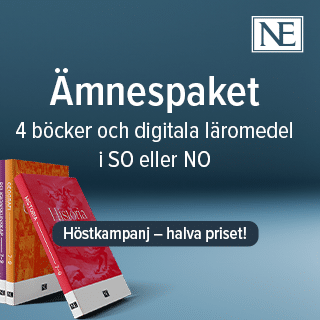(Special)pedagogik och social utslagning: Perspektivisering – möjligheter och dilemman
Vem försvarar de svaga grupperna i skolan? Kan specialpedagogiken axla ett solidariskt bevakningsuppdrag?Avhandlingen diskuterar behovet av social rättvisa i skolan när det gäller svagare gruppers livs- och kommunikationsförhållanden. Empirin består av intervjuer och textmaterial som skolpersonal arbetat fram i två dokumentationsprojekt, med fokus både på grundskolans och gymnasieskolans sociala problem.
Ulf Sivertun
Professor Rolf Helldin samt professor Siv Fischbein
Professor Gunnar Stangvik, Högskolan i Finnmark, Norway
2006-11-10
(Special)pedagogik och social utslagning: Perspektivisering – möjligheter och dilemman
Social pedagogy and social exclusion: perpectivization – possibilities and dilemmas
Institutionen för individ, omvärld och lärande (LHS)
(Special)pedagogik och social utslagning: Perspektivisering – möjligheter och dilemman
I avhandlingen diskuteras Habermas teori om kommunikation kritiskt, med fokus på deliberation och skolans sociala problem. Kan den diskussionen ligga till grund för den kritiska teorin och till diskussionen om en demokratisering av skolan som motverkar social utslagning? Om inte, menar författaren att samhällsundersökningar och motstånd med klassanalyser som bas, är den kritiska teorins alternativa huvuduppgift inom skol- och samhällsforskning. Det krävs deltagardemokratiska rättigheter som en bas för en djupgående radikal demokrati . Sett ur svagare gruppers perspektiv är det meningslöst att argumentera för deliberativa samtal i skolan, om de vilar på ojämlika ekonomiska, kulturella och sociala styrkeförhållanden. Författaren menar att Habermas idé om en förståelseorientering inte tar hänsyn till behovet av ett omsorgsperspektiv i (special)pedagogiken, och att strategiska överväganden måste kunna göras i försvaret av marginaliserade elevgruppers rättigheter och livsvillkor. Perspektivisering föreslås som ett pedagogiskt alternativ till deliberation . Olika elevgruppers rätt och skyldighet att delta i en socialt allsidigt sammansatt skola är en bas för resonemangen. Möjligheterna för en perspektivisering av olika sociala- erfarenheter och kunskapsprocesser, lyfts fram som en demokratisk potential. Orimliga förhoppningar om möjligheter till överenskommelser kan skapa falska harmoniföreställningar om skolan som rättvis och demokratisk institution. Svagare gruppers reaktioner på maktlöshet och underrepresenterad ställning förutsätter, säger författaren, att dessa kan utveckla gemensamma handlingsalternativ, dvs. det är nödvändigt att partiell solidaritet och motstånd kan utvecklas gentemot ojämlika och orättvisa tillstånd i skolan och samhället. Pedagogiskt sett, kan asymmetriproblem i samhället och skolan tas som utgångspunkt för en demokratisk kunskapsprocess. Kan specialpedagogiken axla ett solidariskt bevakningsuppdrag? Specialpedagogikens huvuduppgift är då att bevaka och initiera handlingar vid skolans jämlikhets- och rättviseproblem.
Social pedagogy and social exclusion: perpectivization – possibilities and dilemmas
In the thesis, the social and cultural states of communication in school are discussed, as they are expressed by school staffs and accounted for in different forms of school documents. Further, two projects of cooperation between the Stockholm Institute of Education (LHS) and school staffs of certain municipalities are described and analysed. The aim of the thesis is thus to discuss social and cultural problems and possibilities, and also experiences of the documentation work.
Methods of action research have been used, among other things, in documentation work that has been carried out by school staffs of certain participating schools. All through the thesis, problems and conditions of social justice and democratisation of the school are discussed. The main theoretical issue has been to critically discuss some suggestions of deliberative discussions. Is it a passable way, when it comes to weaker groups life and communication circumstances, to bring about a mutual agreement? Is a perspective of care needed in special pedagogy? I question that Habermas lifeworld conceptions can be used in circumstances built on unequal economical, cultural and social conditions of strength. In the thesis I argue in favour of community studies, with class analyses, as the main basis for school and societal research. The marginalized groups reactions to powerlessness and underrepresentation presume that they can develop cooperative alternatives of action. It is necessary also that these groups can develop partial solidarity and resistance towards unfair circumstances. Perspectivization is discussed as an alternative way in unequal pedagogical circumstances. Different studentgroups rights and obligations are to be a part of a socially comprehensive school, constituting a basis for the discussions. Possibilities of perspectivization of different social experiences and processes of knowledge are discussed as a democratic necessity.
Relaterade länkar

Fritidshem
 Åk F–6
Åk F–6 Matematikångest
 Åk 4–Vux
Åk 4–Vux 






